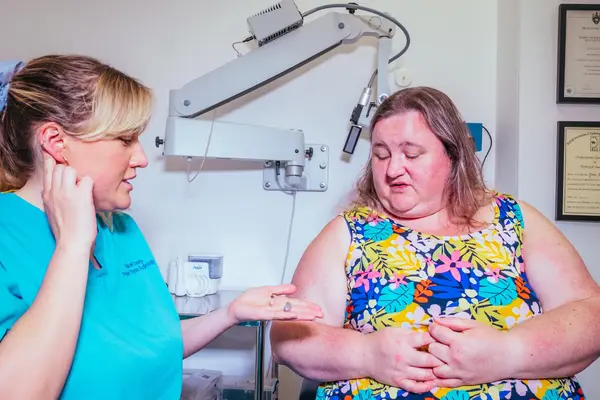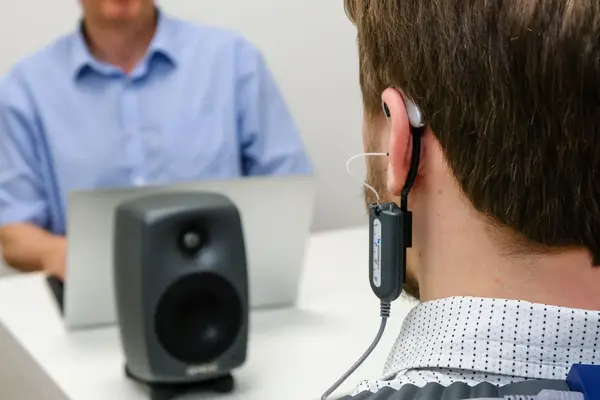The Hidden Connection: Hearing Loss and Dementia
- By Peter Byrom
- 31 March 2025
- 3 minutes 10:57am
As awareness around brain health continues to grow, many people are becoming more conscious of the steps they can take to reduce their risk of cognitive decline. We often hear about eating well, staying physically active, and keeping the mind engaged - but there’s one factor that still flies under the radar for many: hearing loss.
According to the 2020 Lancet Commission on Dementia Prevention, Intervention and Care, untreated hearing loss in midlife is the largest modifiable risk factor for dementia. It accounts for up to 8% of global dementia cases - a higher share than smoking, hypertension, or physical inactivity. In other words, addressing hearing loss could play a vital role in protecting long-term brain health.

What the Research Says
Recent research has reinforced the link between hearing loss and cognitive decline. A 2023 study published in The Lancet Healthy Longevity found that using hearing aids in people with high risk of dementia significantly reduced cognitive deterioration over a three-year period.
Closer to home, researchers at the University of Manchester have identified regional differences in hearing health, noting that adults in the North of England are more likely to experience hearing loss than those in the South. This suggests that public health campaigns in regions like Yorkshire could be particularly impactful.

How Hearing Loss Affects the Brain
Hearing isn't just about your ears - it's a brain process. When sound input is reduced due to hearing loss, the brain has to work much harder to decode conversations. This is known as increased cognitive load.
Instead of simply listening and responding, your brain begins to divert energy from memory, concentration, and problem-solving just to understand speech. Over time, this added strain can accelerate cognitive fatigue and reduce mental sharpness.
Another issue is auditory deprivation. When hearing loss is left untreated, the areas of the brain responsible for processing sound can shrink or become less active. This can impact more than just your ability to hear; it affects how your brain interacts with the world around you.
Social isolation is also a major factor. Struggling to follow conversations often leads people to withdraw from social settings, which has long been recognised as a contributor to anxiety, depression, and cognitive decline.
Why Early Intervention Matters
The good news is that hearing loss is one of the few dementia risk factors we can do something about. The earlier hearing loss is detected and addressed, the more we can reduce its impact on brain function.
Using hearing aids not only improves communication and quality of life, but also helps maintain cognitive performance. In fact, participants in the ACHIEVE study (2023) who used hearing aids regularly showed a 48% reduction in cognitive decline compared to those who didn’t.

What Are the Warning Signs?
Hearing loss can develop gradually, which means it often goes unnoticed. Here are some common signs that it might be time to get your hearing checked:
● Frequently asking people to repeat themselves
● Difficulty hearing in noisy environments, like restaurants or social gatherings ● Turning the volume up higher than usual on the TV or radio
● Avoiding conversations or social events due to frustration
● Feeling mentally drained after listening for long periods
If any of these sound familiar, it’s worth scheduling a hearing assessment. Identifying hearing loss early means you can take action before it begins to affect your mental wellbeing.
What Happens at a Hearing Test?
At Byrom Audiology, we provide comprehensive hearing assessments designed to give you a clear picture of your auditory health. Our tests include:
● Pure Tone Audiometry to identify the softest sounds you can hear across different frequencies
● Speech Testing to assess how well you understand speech at different volumes ● Tympanometry to evaluate the movement of your eardrum and middle ear function
These non-invasive tests are carried out using state-of-the-art equipment in a calm and welcoming environment. We take the time to explain your results clearly and talk you through your options.
If hearing aids are recommended, we’ll guide you through choosing a solution that suits your lifestyle, preferences, and budget. As an independent clinic, we’re not tied to a single manufacturer, meaning we can offer completely personalised advice.
Supporting Brain Health Starts Here
The idea that hearing care is brain care might be new to some, but the science is clear. Addressing hearing loss isn’t just about improving your ability to hear - it’s about preserving your independence, memory, and overall cognitive wellbeing.
If you’re over 50 and haven’t had a hearing test in the past few years, now is the time. A simple check-up could make all the difference.
Book a Hearing Test Today
To schedule a hearing assessment at our Sheffield clinic, call 0114 419 1800 or email support-team@peterbyrom.co.uk. You can also find more information or make an enquiry via our contact form.
Early intervention is one of the most powerful tools we have in protecting both hearing and brain health. Don’t wait for the signs to become impossible to ignore.
Services
Our Clinics
-
Byrom Audiology
Thornbury Hospital
312 Fulwood Road
Sheffield S10 3BR -
Byrom Audiology
12 Causeway Head Road Dore
Sheffield S17 3DT
0114 419 1800 - support-team@peterbyrom.co.uk


